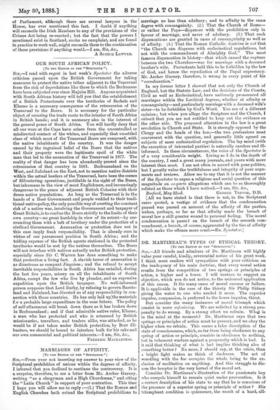MARRIAGES OF AF.N.LN1TY.
[To THE EDITOR OP THE " SPECTATOR:1
SIR,—From your not inserting my answer to your view of the Scriptural prohibition of unions within the degrees of affinity, I inferred that you declined to continue the controversy. It is a surprise, therefore, to see a letter from Mr. Archer Gurney, writing "as a clergyman and a High Churchman," and citing the "Latin Church" in support of your contention. This time I hope you will allow me to reply :—(1.) That the Roman and English Churches both extend the Scriptural prohibitions to marriage no less than adultery ; and to affinity in the same degree with consanguinity. (2.) That the Church of Rome— or rather the Pope—dispenses with the prohibition only in favour of marriage, and never of adultery. (3.) That such dispensations are granted in cases of consanguinity as well as of affinity. (4.) That the Roman Catholic doctrine is not that "the Church can dispense with ecclesiastical regulations, but not with the commandment of Almighty God." The most famous dispensation in history—that which caused the rupture between the two Churches—was for marriage with a deceased brother's wife. Protestants held this to be forbidden by the law of God, and hence the repudiation of the Papal supremacy. Mr. Archer Gurney, therefore, is wrong in every point of his " corroboration."
In my former letter I showed that not only the Church of England, but the Statute Law, and the decisions of the Courts, Civil as well as Ecclesiastical, have uniformly pronounced all marriages within the Levitical degrees, whether of affinity or consanguinity—and particularly marriage with a deceased wife's sister—to be forbidden by God's Word. You are of a different opinion; but when you allege the Scripture and the Church, I submit that you are not entitled to keep out the evidence on the other side. The proposed alteration in the law is a great revolution in Church and State. It is strongly opposed by the Clergy and the heads of the law,—the two professions most conversant with the question, and generally little agreed on subjects of mere ecclesiastical regulation. The lay mind (with the exception of interested parties) is naturally careless and illinformed. In these circumstances, the voice of the Spectator is of a very considerable weight. Living as I do in the depth of the country, I read a great many journals, and yours with more interest than most. I am not often in accord with your politics, but I greatly value the truthfulness and integrity of your arguments and reviews. Allow me to say that it is not the manner of the Spectator to argue a religions and social question of this magnitude on ex-parte allegations which can be so thoroughly refuted as those which I have noticed.—I am, Sir, &c., Beeford, May 22nd. GEORGE TREVOR, D.D.
[All we have stated is that there is not, in the Scriptural cases quoted, a vestige of evidence that the condemnation passed was passed on account of the affinity of the parties, unless, perhaps, so far as that affinity made the breach of moral law a still greater wound to personal feeling. The moral condemnation is passel on the breach of the seventh commandment, a breach, of course, aggravated by the ties of affinity which make the offence more cruel.—En. Spectator.]














































 Previous page
Previous page